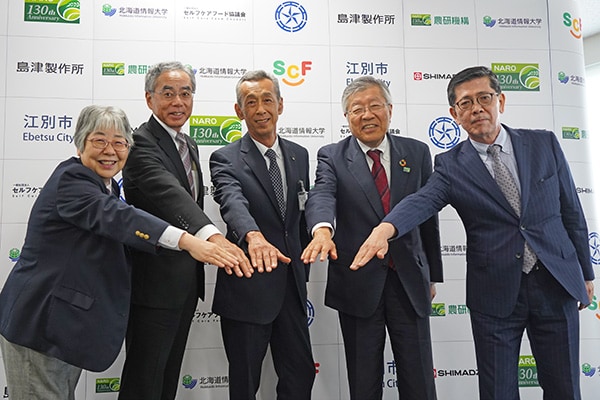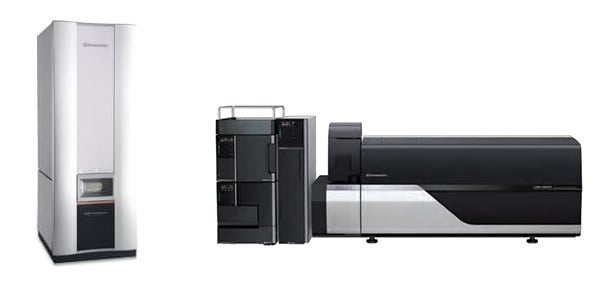October 19, 2023 | News & Notices
Studying 1,200 People over 10 Years to Investigate the Association between Diet and Cognitive Function
Shimadzu Corporation, Ebetsu City, Hokkaido Information University, National Agriculture and Food Research Organization, and Self Care Food Council Commence a Joint Cohort Study
From September 12, Shimadzu Corporation, Ebetsu City (Hokkaido), Hokkaido Information University (a member of the Electronics Development Computer College group), the National Agriculture and Food Research Organization (hereinafter NARO), and the Self Care Food Council (hereinafter SCFC) will commence a joint cohort study entitled “Ebetsu’s Active Future Study.” The objective of the study is to find blood biomarkers for mild cognitive impairment (MCI), investigate dietary-oriented measures that prevent the progression of dementia, and study the association between local community development and a healthy life span. Physical fitness tests and cognitive function tests including blood biomarker measurements will be conducted in Ebetsu City residents (up to 1,200 people) aged between 55 and 75 years (as of April 1, 2023) over a 10-year period, along with questionnaire-based surveys of diet and lifestyle. This will be the first large-scale research study into factors that cause Alzheimer’s dementia (hereinafter Alzheimer’s disease) conducted in Japan by a local government, university, national research institution, and private company.

Photo of the Press Conference
From left to right : Mari Yamamoto, Representative Director of the Self-Care Food Council, Yasunori Yamamoto, President and CEO of Shimadzu Corporation, Yoshito Goto, Mayor of Ebetsu City(Hokkaido), Kazuo Kyuma, President of the National Agriculture and Food Research Organization, Jun Nishihira, President of Hokkaido Information University
The tests performed as part of the study will be conducted once per year and will require around 2 hours to complete. The study will collate and reference data on the cognitive function, mental and physical health, and lifestyle of participants, look for blood biomarkers that predict the onset of MCI, and investigate diet-oriented measures that prevent the progression of dementia. Shimadzu Corporation will be responsible for analyzing and evaluating results from blood biomarker measurements performed using the Amyloid MS CL system*1 for measuring amyloid peptides in blood and MCI Screening Test Plus*2. Hokkaido Information University will analyze physical test data such as a motion capture-based assessment of walking motion. NARO will use the results of the study to investigate links between diet and cognitive function and search for nutritionally functional components in food that maintain cognitive function. Finally, SCFC will support the development of food products among its food manufacturer members based on the findings of “Ebetsu’s Active Future Study.”

Left: Amyloid MS CL system for measuring amyloid peptides in blood, Right: LCMS-8060NX ultra fast liquid chromatograph mass spectrometer used for MCI Screening Test Plus
Alzheimer’s disease, which accounts for around 60 % of dementia cases, begins around 20 years before symptomatic onset with the accumulation of amyloid-β in the brain, with amyloid-β being one of the substances that causes Alzheimer’s disease. MCI is a decline of cognitive function and is considered a pre-dementia condition. Adopting appropriate measures at the MCI stage could prevent the onset or progression of dementia.
In June 2022, Shimadzu Corporation, Ebetsu City, Hokkaido Information University, NARO, and SCFC entered into a comprehensive partnership agreement that aims to facilitate the construction of societal systems that reduce and prevent the risk of MCI. The above five parties will create a database of information on the health and lifestyle habits of up to 1,200 people over the next 10 years to investigate the causal relationship between diet and cognitive function. The enactment of The Basic Act on Dementia in June of this year will also bring an increase in initiatives for promoting foundational and clinical research aimed at elucidating factors that cause dementia and the prevention of dementia. With this study, the above five parties aim to effect dietary and other self-care solutions in society that will reduce the risk of MCI based on improved living.
- *1 Amyloid MS CL is an analytical instrument made by Shimadzu Corporation that measures amyloid peptides (a key component of amyloid plaques that characterize Alzheimer’s disease) in blood and gives levels of amyloid-β-related biomarkers. Amyloid MS CL uses MALDI (matrix-assisted laser desorption/ionization) technology that earned Koichi Tanaka, an Executive Research Fellow at Shimadzu Corporation, the Nobel Prize in Chemistry. In June 2021, the Amyloid MS CL system became the first instrument to measure amyloid peptides using MALDI technology to be approved as a medical system in Japan.
- *2 MCI Screening Test Plus is a test offered by MCBI Inc., a funded b funded by University of Tsukuba and Shimadzu Corporation. The MCI Screening Test Plus test evaluates the risk of developing MCI based on proteins in the blood related to nutrition, lipid metabolism, and immunology.
Details of joint “Ebetsu’s Active Future Study”
Study period: Commencing sequentially from September 12, 2023 (10-year duration to 2032)
Requirements for participation: Ebetsu City resident 55 years or older and 75 years or younger (as of April 1, 2023)
Number of recruitees: 1,200 maximum (aiming for an observational study of 1000 people each year over 10 years)
Main details of study: History taking (past medical history, current medical history, history of drug use, family history, etc.), physical and fitness measurements (height, body composition, lower-limb muscle strength and balance, grip strength, chair stand time, walking motion, etc.), blood tests (liver function, kidney function, blood lipids, blood sugar, nutritional status, aging factors, potential markers predictive of mild cognitive impairment, etc.), blood pressure measurement, health survey, and self-written questionnaire on lifestyle and diet conducted once per year


